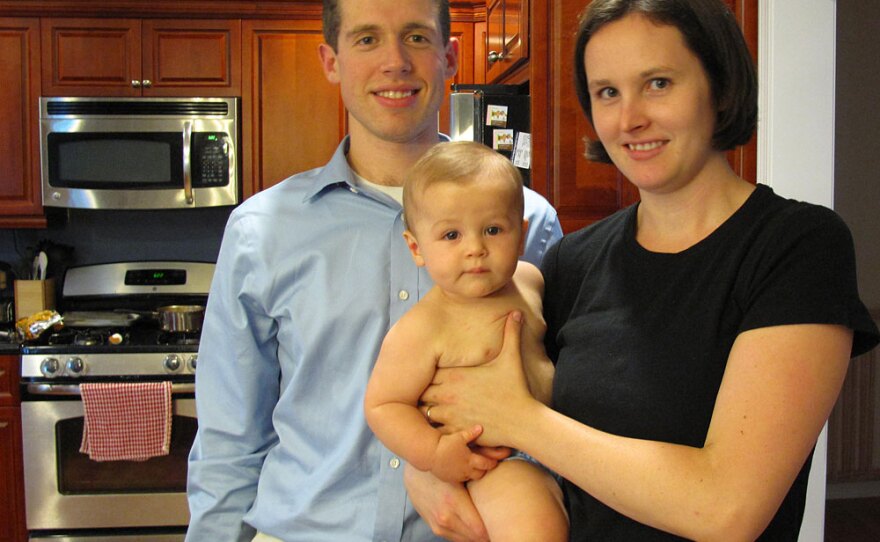Part of a series on tax policy
When it comes to taxes in the U.S., it's the income tax -- and the annual April 15 deadline for filing returns -- that gets most of our attention. But that's only part of the picture -- there are property taxes and sales taxes, even taxes built into every cell phone bill. In the name of documenting how much of a family's income goes to taxes, one couple in Connecticut agreed to open their books.
Harlan and Tess Milkove, who met during their freshman year of college, are both 26 years old and work as engineers. They own a home in Stratford, and they have an 8-month-old son, Ethan.
A gas station near their home offers the first glimpse at their tax picture: Harlan Milkove pulls his car in to fill up the tank, and 12 1/2 gallons later, his receipt says he spent $44.91.
"They don't break out the taxes from that," he says. Connecticut residents pay 60.3 cents per gallon in state and federal gas taxes. For the Milkoves, who use about 1,200 gallons a year, that adds up to just over $700.
But that's a small piece of the big picture; there are many more taxes to tally. At home, Milkove spreads tax returns, receipts and various bills on the dining room table. He pulls out his laptop, where he tracks the family's spending.
"This looks scary, but it's very organized," he says. The table is buried. Tess flees to the living room.
We tally up state and federal income tax, Social Security and Medicare taxes using data from their 2009 returns. These taxes, taken out of their paychecks each month, account for more than three-quarters of the Milkoves' tax burden.
The property tax on their home comes to just under $5,000. And in Connecticut, they also have to pay property tax on their two cars.
"Car tax due is $433.84, and Tess' is $395.52," Milkove says, reading from the bills. "It's like an extra car payment for each car -- comes out pretty close."
Milkove is one of those people who carefully track just about every dollar spent, so we're able to get a good picture of how much sales tax they pay in a year. We look at spending for the first six months of 2010 and double it. Aside from groceries and clothing, most purchases are taxed at 6 percent. The sales tax grand total for the year is $400.
They don't smoke, but if they did, they'd pay more than $4 a pack in taxes. They do drink, a little. We figure they pay about $65 a year in alcohol excise taxes.
The Milkoves are going on a couple of short vacations, so we add in hotel taxes, rental car taxes and about $85 worth of taxes on just two round-trip plane tickets. Then we dig into their phone bills and find yet more taxes.
"There's a public safety communications surcharge, county sales tax, state telecom excise tax," Milkove says, reading from his phone bill. The cell phone and home phone bills both are about 20 percent tax.
"That's kind of disgusting," he says after doing the math. But an entire year's worth of telecom taxes doesn't even add up to 1 percent of the family's tax total.
"People get very frustrated at taxes that are relatively small compared to big taxes," says Gerald Prante, an economist at the Tax Foundation, a Washington-based tax-tracking think tank.
"I mean, if you look at this list," he says, looking at the tax tally that Milkove came up with, "everything is chump change compared to the federal income tax.
"Taxes he's bearing directly, this is a pretty comprehensive list," Prante says. But there are other taxes that people pay indirectly.
When the Tax Foundation looks at this larger picture, it finds that Americans on average pay 28 percent of their income to taxes -- though it varies widely by income.
The Milkoves, it turns out, are paying just over 24 percent.
After doing all of the math, Harlan Milkove seems more tired than anything else. "It's not fun. I wouldn't recommend it," he says. "You wasted an evening, and it just ticks you off."
Copyright 2023 NPR. To see more, visit https://www.npr.org. 9(MDM3NjYwMjA5MDE1MjA1MzQ1NDk1N2ZmZQ004))



